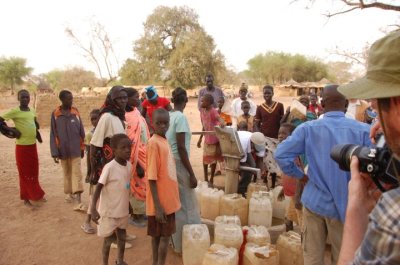US Asked to Prevent Possible 'Genocide' of Persecuted Christians in Southern Sudan
The Islamist government of Sudan has been accused of taking up again the process of systematically killing the people of the Nuba Mountains, a region in the south of the country that is 30 percent Christian – and the U.S. government is being called on to intervene.

The Sudanese government has allegedly continued killing the inhabitants of the Nuba Mountains region lying in an area called Southern Kordofan, where it left off in the 1980s and 1990s, Brad Phillips, president and founder of Persecution Projects Foundation. Phillips, whose Christian nonprofit ministry has been working in Sudan since 1998, confirmed to The Christian Post Friday multiple reports of systematic attacks on people of specific backgrounds in that region since the summer of 2011.
But there is not enough public awareness about the violence, and the ministry has made it its goal to lobby President Barack Obama using a new venture, called Save the Nuba, to prevent their potential genocide. The petition to President Obama, available on the nonprofit's website, has been gathering signatures.
"What we're asking people to do is to sign the petition to let our government know that it has a responsibility to protect innocent civilians there and to use every means possible to try to allow humanitarian access for these people in the Nuba Mountains that are being targeted for annihilation," Phillips told CP.
Sudan is ethnically 70 percent Arab, with the rest of the population being indigenous African peoples like the Fur, Zaghawa, Massalit, Beja, Nuba, and Dinka Ngok. The country has been in the state of civil war for the past two decades largely on ethnic and religious grounds, until 2005, when the Comprehensive Peace Agreement (CPA) was signed, overseen by the United States.
In July 2011, the southern, mostly Christian territory seceded, establishing South Sudan. That summer, the government of Sudan, which is a country that is 70 percent Muslim and has a conservative Islamic government and a horrific history of violence (as shown by the Darfur conflict), broke the peace agreement and began targeting the ethnic Nuba people in the south, as well as Christians and any apostates from Islam, according to reports. Reports have been emerging that the government's goal is to make the nation ethnically Arab and, religion-wise, Muslim, even at the cost of eradicating all ethnic and religious minorities.
"Basically, the policy of Khartoum [capital of Sudan] that they had before the peace was signed in 2005, and what they have after this interim period is essentially the same," Phillips told CP. "Which is to annihilate the African population, to strictly impose Sharia law in all the areas which they administrate and to [eradicate] the Christian population and the non-observing Muslim population and anybody that is racially 'inferior' as well."
With missions in several locations across the country, Persecution Projects Foundation has been bringing relief, the Gospel and advocacy services to the persecuted people, Phillips told CP. The people fleeing violence were forced to search for shelter in mountain caves and flee abroad, usually to Southern Sudan, which also reportedly recently has been experiencing air strikes from Sudanese forces.
The Nuba population numbers about 500,000, of which about 30 percent are Christians of various denominations, the minister told CP. The people living in the Nuba Mountains region who are either ethnic Nuba, Christian, apostate or associated with the opposition party, are being targeted by government forces systematically, including airstrikes, he said.
It is estimated that around 100,000 people have fled their homes in the region since the second half of 2011, when the Sudanese government launched the offensive against South Kordofan as well as another southern region called Blue Nile.
Phillips' ministry is lobbying for more funding for humanitarian aid in the region, emphasizing that the U.S. government is not only responsible for protecting the vulnerable people from potential genocide, but also for guarding the peace agreement which it oversaw.
"The rebel leaders are not asking for any help except they recognize that the tactic [of the government] is not to fight soldiers but to kill civilians," he added. That is the same tactics used previously in the Darfur conflict, he suggested, calling the government a "terrorist regime."
"The [U.S.] government has the responsibility as caretakers of this peace agreement" to come with help to the endangered people, Phillips said. "Khartoum is not fulfilling its part of the deal."





















